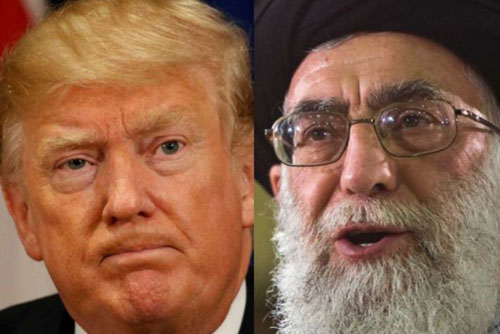by WorldTribune Staff, May 19, 2019
The United States has made overtures for talks with Iran to “de-escalate” the current situation and is reportedly “sitting by the phone” awaiting the Islamic Republic’s response.
President Donald Trump’s overtures for direct talks with Iranian leadership comes as tensions between the two countries and their allies in the region have increased.

“We think they should de-escalate and come to negotiations,” a Trump administration official, who declined to be identified, told a small group of reporters on May 17, according to Reuters.
The U.S. has deployed an aircraft carrier and B-52 bombers to the Middle East in a move meant to counter “clear indications” of threats to American forces in the region from Iran and its proxies.
Related: Reports: Mossad warned that IRGC was set to strike U.S. ships, bases in Persian Gulf, May 14
Reports last week said that Trump had publicly appealed to Iran to call him amid. The reports said the White House contacted the Swiss to share the phone number.
Iran, however, rejected the overture, with Deputy Foreign Minister Abbas Araghchi saying, “The solution does not lie in the mediations or the phone call and the U.S. has our phone numbers too.”
Asked if there were any indications from the Iranians that they were ready to engage in talks, the Trump administration official said on May 17, “Not yet. We’re sitting by the phone.”
The deputy leader of Iran’s Islamic Revolutionary Guard Corps’ political bureau later stressed that Iran will not engage in talks with the U.S. and added that the United States would never “dare” to attack the Islamic Republic.
Amid the mounting tensions, the Federal Aviation Administration (FAA) on May 16 warned U.S. commercial airliners flying over the waters of the Persian Gulf that they risked being misidentified.
An advisory issued by the FAA said the warning came amid “heightened military activities and increased political tensions in the region which present an increasing inadvertent risk to U.S. civil aviation operations due to the potential for miscalculation or mis-identification.”
Also, U.S. oil giant ExxonMobil evacuated its foreign staff from an oil field in Iraq, the country’s oil minister says.
Iraqi Oil Minister Thamir Ghadhban said in a May 19 statement that ExxonMobil’s decision was “unacceptable and unjustified” and had “nothing to do with the security situation or threats in the oilfields in of southern Iraq,” adding that it was “political.”
Some observers say the move by ExxonMobil may have been precipitated by Saudi Arabia’s accusation that Iran ordered recent drone attacks on Saudi oil facilities that were claimed by the Houthi rebels, an Iranian terror proxy.
Saudi Deputy Defense Minister Khalid bin Salman tweeted on May 16 that the attacks were “ordered by the regime in Teheran,” which he accused of using the Houthis as “a tool…to implement its expansionist agenda in the region.”
Saudi Foreign Minister Adel al-Jubeir tweeted that the Houthi rebels were “sacrificing the need of the Yemeni people for the benefit of Iran.”
A Saudi-led military coalition confirmed it had carried out air strikes on the Yemeni capital, Sanaa, saying the move aimed at “neutralizing the ability of the Houthi militia to carry out acts of aggression,” according to Saudi-owned broadcaster Al-Arabiya.
Reports said that the air strikes targeted military sites in and around rebel-held Saana, and left a number of people dead.
The Houthis said their May 14 drone attacks that damaged a Saudi oil pipeline were a response to “crimes” committed by Riyadh in Yemen.
Your Intel Brief: Geostrategy-Direct __________ Fix The Media Now
